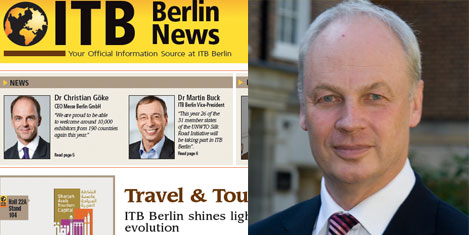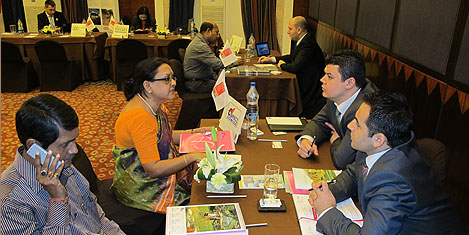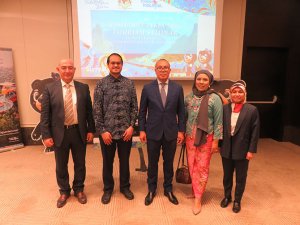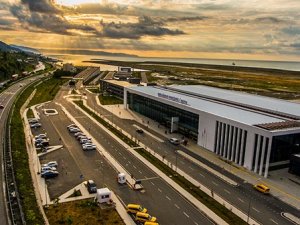BERLİN -The World Travel and Tourism Council has underlined what could be a major stumbling block to the future of the industry: a lack of enough talent to keep pace with global growth. At ITB Berlin, David Scowsill, President & CEO, WTTC will be addressing this, and other key issues. In this exclusive interview, we firstly asked him what his current vision is of the global tourism scene...
WTTC WORKS TO RAISE AWARENESS OF TRAVEL & TOURISM’S HUGE CAPACITY AS A FORCE FOR GOOD IN THE WORLD
The global travel & tourism industry is in good health. In 2014 our contribution to the world economy grew for the fourth consecutive year and is expected to continue to show growth once again in 2015. Globally, our industry accounts for almost 10% of global GDP and one in11ofalljobsonthe planet. Increasingly, governments understand that our industry is a driver of job creation and economic growth and that the right policies need to be implemented to increase tourism receipts and jobs.
What are the main issues at the heart of WTTC’s actions?
WTTC works to raise awareness of Travel & Tourism’s huge capacity as a Force for Good in the world, generating not only jobs, wealth and economic growth, but also as a driver of peace, creating a wider understanding of cultures and communities.
The Council strives to break down the barriers hampering Travel & Tourism’s growth by urging governments and regulators to keep the sector high on the political agenda and creating policies that support its long-term growth and prosperity.
WTTC campaigns on three strategic priorities which impede the successful development of Travel & Tourism now and in the future – Freedom to Travel; Policies for Growth; and Tourism for Tomorrow.
We advocate partnership between public and private sectors, speaking with one voice, in addressing these issues and delivering results that match the needs of people, planet and profit.
In terms of facilitating travel, which countries have made the greatest strides in the past year?
Travel facilitation remains the biggest single step that countries can take to truly maximise the economic and social benefits of Travel & Tourism; and steady progress has been made in the last year. We have seen an historic agreement between China and US to extend mutual visa validity from 1 year to 10 years; India expanding visas on arrivalto 43 countries; and Japan has introduced a series of visa facilitation measures for several countries.
You recently congratulated the UK Chancellor for pledging to abolish Air Passenger Duty (APD) for children under 16, but said the next UK government needs to stop curbing jobs and axe the self-defeating tax completely... Please expand on this...
The UK Chancellor’s pledge to abolish APD for children under 16 from 1 May 2016 is a welcome step, which will bring major holiday savings for UK families as well as boost inbound travel to the UK. However, the pledge does not go far enough. The next Government needs to dramatically reduce or abolish APD completely. The UK is currently one of the most expensive places to visit in the world. Evidence suggests that APD is having a detrimental effect on Travel & Tourism around the world as well. The contribution of Travel & Tourism to global GDP is 9.5% and the sector accounts for one in 11 jobs globally. It makes a huge social and economic contribution. Abolishing the tax for good would boost global GDP and job creation. In early 2012, WTTC undertook research to understand the economic impact of APD on the UK’s GDP and employment. The research indicated that the impact is significant and that removing Air Passenger Duty would result in an additional 91,000 British jobs being created and £4.2 billion added to the economy in 12 months. The tax is currently self-defeating and it is overdue for it to be consigned to history. At a time when young people need employment and the economy needs boosting, it is an opportunity which the next Government cannot afford to miss.
WTTC has underlined a major issue in the shortage of talent for the travel and
tourism industries. What do you feel should be done to overcome this problem?
Travel & Tourism is one of the world’s largest economic sectors. It drives jobs and economic growth, well-being and prosperity. It creates jobs at different skills levels for often-marginalised sectors of society, such as young people and women, and in areas where other employment opportunities are scarce.
When I speak to the leaders of the world’s Travel & Tourism companies, it is clear that the biggest challenge to their growth plans is the supply and retention of talent across all levels of their businesses.
That is borne out by WTTC research that shows that our industry could employ 14m fewer people and contribute $610 billion less in GDP to the world economy over the next ten years by the failure of Government and private companies to implement policies which promote proactive and careful talent management.
Travel & Tourism currently sustains 266 million jobs, once the indirect and induced impacts are taken into consideration, a figure projected to rise to 347 million by 2024. Similarly, the industry contributed nearly $7 trillion to the global economy in 2014; which is forecast to rise to $11 trillion by 2024. The research, for the first time, quantified the sheer scale of the human resource challenge in Travel & Tourism and the potential impact of the skill shortage on the 2024 projections, which are the equivalent of lowering the level of global total Travel & tourism employment by 4% compared to the baseline projected level in 2024.
We are a people industry, which depends on quality people to deliver a quality product to our customers. I urge anyone with an interest in our great industry to act now to address the anticipated talent shortage. We need the right policies, programmes and partnerships in place, to ensure that the workforce of the future knows about the opportunities in our sector, and has the appropriate skills and knowledge to support future growth.
Failure to plan properly for talent requirements leads to lower growth, reduced investment, less innovation and declining competitiveness – for both countries and companies.
What are the key messages of WTTC at ITB Berlin this year?
Undoubtedly the key message from WTTC at ITB Berlin this year is that the industry and government must plan now for the looming human resources challenge. As I just mentioned, our research shows that Travel & Tourism could employ 14m fewer people and contribute $610 billion less in GDP to the world economy over the next ten years if Governments and private sector companies do not act now to address the talent shortage in the industry.







































Türkçe karakter kullanılmayan ve büyük harflerle yazılmış yorumlar onaylanmamaktadır.